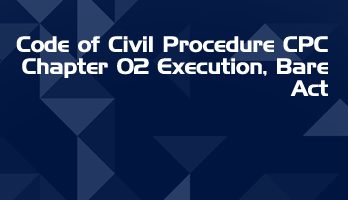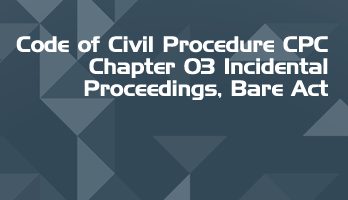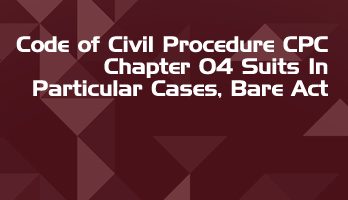A 'Bare act' is the actual legislation passed by the Parliament of India. Generally, an act sets out the high level legal and policy principles applicable to the subject matter of the law.
Most acts are accompanied by 'subsidiary legislation' such as rules, regulations, notifications and orders; which address the actual implementation detail of the act.
Free Full Course Available on LawMint's YouTube Channel
How to Land Your Dream LLB Internship in a Top Law Firm
- Part 1 - Introduction
- Part 2 - Internship Planning
- Part 3 - Internship Research
- Part 4 - Building Your Profile
- Part 5 - The Email
- Part 6 - The Resume
- Part 7 - The Cover Letter
- Part 8 - The Interview
- Part 9 - Self Development
Practical and comprehensive course, with real examples and step-by-step analysis of the complete internship application process. Check out LawMint's YouTube channel now!
Hindu Marriage Act, 1955
Chapter V – Jurisdiction and Procedure
Section 19 – Court to which petition shall be presented
Every petition under this Act shall be presented to the district court within the local limits of whose ordinary original civil jurisdiction –
- the marriage was solemnized, or
- the respondent, at the time of the presentation of the petition, resides, or
- the parties to the marriage last resided together, or (iiia) in case the wife is the petitioner, where she is residing on the date of presentation of the petition, or;
- the petitioner is residing at the time of the presentation of the petition, in a case where the respondent is, at that time, residing outside the territories to which this Act extends, or has not been heard of as being alive for a period of seven years or more by those person who would naturally have heard of him if he were alive.
Section 20 – Contents and verification of petitions
- Every petition presented under this Act shall state as distinctly as the nature of the case permits the facts on which the claim to relief is founded and, except in a petition under section 11, shall also state that there is no collusion between the petitioner and the other party to the marriage.
- The statements contained in every petition under this Act shall be verified by the petitioner or some other competent person in the manner required by law for the verification of plaints, and may, at the hearing, be referred to as evidence.
Section 21 – Application of Act 5 of 1908
Subject to the other provisions contained in this Act and to such rules as the High Court may make in this behalf, all proceedings under this Act shall be regulated, as far as may be, by the Code of Civil Procedure, 1908.
Section 21A – Power to transfer petitions in certain cases
- Where –
- a petition under this Act has been presented to a district court having jurisdiction by a party to a marriage praying for a decree for judicial separation under section 10 or for a decree of divorce under section 13, and
- another petition under this Act has been presented thereafter by the other party to the marriage praying for a decree for judicial separation under section 10 or for a decree of divorce under section 13 on any ground, whether in the same district court or in a different district court, in the same State or in a different State, the petitions shall be dealt with as specified in sub – section (2).
- In a case where sub – section (1) applies, –
- if the petitions are presented to the same district court, both the petitions shall be tried and heard together by that district court;
- if the petitions are presented to different district courts, the petition presented later shall be transferred to the district court in which the earlier petition was presented and both the petitions shall be heard and disposed of together by the district court in which the earlier petition was presented.
- In a case where clause (b) of sub – section (2) applies, the court or the Government, as the case may be, competent under the Code of Civil Procedure, 1908 (5 of 1908), to transfer any suit or proceeding from the district court in which the later petition has been presented to the district court in which the earlier petition is pending, shall exercise its powers to transfer such later petition as if it had been empowered so to do under the said Code.
Section 21B – Special provision relating to trial and disposal of petitions under the Act
- The trial of a petition under this Act shall, so far as is practicable consistently with the interests of justice in respect of the trial, be continued from day to day until its conclusion unless the court finds the adjournment of the trial beyond the following day to be necessary for reasons to be recorded.
- Every petition under this Act shall be tried as expeditiously as possible and endeavour shall be made to conclude the trial within six months from the date of service of notice of the petition on the respondent.
- Every appeal under this Act shall be heard as expeditiously as possible, and endeavour shall be made to conclude the hearing within three months from the date of service of notice of appeal on the respondent.
Section 21C – Documentary evidence
Notwithstanding anything in any enactment to the contrary, no document shall be inadmissible in evidence in any proceeding at the trial of a petition under this Act on the ground that it is not duly stamped or registered.
Section 22 – Proceedings to be in camera and may not be printed or published
- Every proceeding under this Act shall be conducted in camera and it shall not be lawful for any person to print or publish any matter in relation to any such proceeding except a judgment of the High Court or of the Supreme Court printed or published with the previous permission of the court.
- If any person prints or publishes any matter in contravention of the provisions contained in sub – section (1), he shall be punishable with fine which may extend to one thousand rupees.
Section 23 – Decree in proceedings
- In any proceeding under this Act, whether defended or not, if the court is satisfied that
- any of the grounds for granting relief exists and the petitioner except in cases where the relief is sought by him on the ground specified in sub clause (a), sub – clause (b) or sub – clause (c) of clause (ii) of section 5 is not in any way taking advantage of his or her own wrong or disability for the purpose of such relief, and
- where the ground of the petition is the ground specified in clause (i) of sub – section (1) of section 13, the petitioner has not in any manner been accessory to or connived at or condoned the act or acts complained of, or where the ground of the petition is cruelty the petitioner has not in any manner condoned the cruelty, and (bb) when a divorce is sought on the ground of mutual consent, such consent has not been obtained by force, fraud or undue influence, and
- the petition (not being a petition presented under section 11) is not presented or prosecuted in collusion with the respondent, and
- there has not been any unnecessary or improper delay in instituting the proceeding, and
- there is no other legal ground why relief should not be granted, then, and in such a case, but not otherwise, the court shall decree such relief accordingly.
- Before proceeding to grant any relief under this Act, it shall be the duty of the court in the first instance, in every case where it is possible so to do consistently with the nature and circumstances of the case, to make every endeavour to bring about a reconciliation between the parties: Provided that nothing contained in this sub – section shall apply to any proceeding wherein relief is sought on any of the grounds specified in clause (ii), clause (iii), clause (iv), clause (v), clause (vi) or clause (vii) of sub – section (1) of section 13.
- F or the purpose of aiding the court in bringing about such reconciliation, the court may, if the parties so desire or if the court thinks it just and proper so to do, adjourn the proceedings for a reasonable period not exceeding fifteen days and refer the matter to any person named by the parties in this behalf or to any person nominated by the court if the parties fail to name any person, with directions to report to the court as to whether reconciliation can be and has been, effected and the court shall in disposing of the proceeding have due regard to the report.
- In every case where a marriage is dissolved by a decree of divorce, the court passing the decree shall give a copy thereof free of cost to each of the parties.
Section 23A – Relief for respondent in divorce and other proceedings
In any proceeding for divorce or judicial separation or restitution of conjugal rights, the respondent may not only oppose the relief sought on the ground of petitioner’s adultery, cruelty or desertion, but also make a counter – claim for any relief under this Act on that ground; and if the petitioner’s adultery, cruelty or desertion is proved, the court may give to the respondent any relief under this Act to which he or she would have been entitled if he or she had presented a petition seeking such relief on that ground.
Section 24 – Maintenance pendente lite and expenses of proceedings
Where in any proceeding under this Act it appears to the court that either the wife or the husband, as the case may be, has no independent income sufficient for her or his support and the necessary expenses of the proceeding, it may, on the application of the wife or the husband, order the respondent to pay to the petitioner the expenses of the proceeding, and monthly during the proceeding such sum as, having regard to the petitioner’s own income and the income of the respondent, it may seem to the court to be reasonable. Provided that the application for the payment of the expenses of the proceeding and such monthly sum during the proceeding, shall, as far as possible, be disposed of within sixty days from the date of service of notice on the wife or the husband, as the case may be.
Section 25 – Permanent alimony and maintenance
- Any court exercising jurisdiction under this Act may, at the time of passing any decree or at any time subsequent thereto, on application made to it for the purpose by either the wife or the husband, as the case may be, order that the respondent shall pay to the applicant for her or his maintenance and support such gross sum or such monthly or periodical sum for a term not exceeding the life of the applicant as, having regard to the respondent’s own income and other property, if any, the income and other property of the applicant, the conduct of the parties and other circumstances of the case, it may seem to the court to be just, and any such payment may be secured, if necessary, by a charge on the immovable property of the respondent.
- If the court is satisfied that there is a change in the circumstances of either party at any time after it has made an order under sub – section (1), it may, at the instance of either party, vary, modify or rescind any such order in such manner as the court may deem just.
- If the court is satisfied that the party in whose favour an order has been made under this section has re – married or, if such party is the wife, that she has not remained chaste, or, if such party is the husband, that he has had sexual intercourse with any woman outside wedlock, it may at the instance of the other party vary, modify or rescind any such order in such manner as the court may deem just.
Section 26 – Custody of children
In any proceeding under this Act, the court may, from time to time, pass such interim orders and make such provisions in the decree as it may deem just and proper with respect to the custody, maintenance and education of minor children, consistently with their wishes, wherever possible, and may, after the decree, upon application by petition for the purpose, make from time to time, all such orders and provisions with respect to the custody, maintenance and education of such children as might have been made by such decree or interim orders in case the proceeding for obtaining such decree were still pending, and the court may also from time to time revoke, suspend or vary any such orders and provisions previously made: Provided that the application with respect to the maintenance and education of the minor children, pending the proceeding for obtaining such decree, shall, as far as possible, be disposed of within sixty days from the date of service of notice on the respondent.
Section 27 – Disposal of property
In any proceeding under this Act, the court may make such provisions in the decree as it deems just and proper with respect to any property presented, at or about the time of marriage, which may belong jointly to both the husband and the wife.
Section 28 – Appeals from decrees and orders
- All decrees made by the court in any proceeding under this Act shall, subject to the provisions of sub – section (3), be appealable as decrees of the court made in the exercise of its original civil jurisdiction, and every such appeal shall lie to the court to which appeals ordinarily lie from the decisions of the court given in the exercise of its original civil jurisdiction.
- Orders made by the court in any proceeding under this Act under section 25 or section 26 shall, subject to the provisions of sub – section (3), be appealable if they are not interim orders, and every such appeal shall lie to the court to which appeals ordinarily lie from the decisions of the court given in exercise of its original civil jurisdiction.
- There shall be no appeal under this section on the subject of costs only.
- Every appeal under this section shall be preferred within a period of ninety days from the date of the decree or order.
Section 28A – Enforcement of decrees and orders
All decrees and orders made by the court in any proceeding under this Act shall be enforced in the like manner as the decrees and orders of the court made in the exercise of its original civil jurisdiction for the time being in forced.
Important Central Acts in Regional Languages
Legislative department website also features regional language versions of several important Central Acts.
Free Full Course Available on LawMint's YouTube Channel
How to Land Your Dream LLB Internship in a Top Law Firm
- Part 1 - Introduction
- Part 2 - Internship Planning
- Part 3 - Internship Research
- Part 4 - Building Your Profile
- Part 5 - The Email
- Part 6 - The Resume
- Part 7 - The Cover Letter
- Part 8 - The Interview
- Part 9 - Self Development
Practical and comprehensive course, with real examples and step-by-step analysis of the complete internship application process. Check out LawMint's YouTube channel now!












